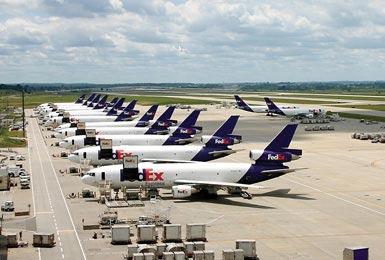The Area Development Frontline series offers insight into successful, innovative strategies taken by businesses; intelligence on locations that are deploying winning policies that attract investment and talent; and reports on industry trends that affect and shape the global business climate now and in the future.
Experts believe that, in the near future, most development and economic growth will occur around thriving airports. The concept is called "aerotropolis." While great examples of these developments already exist, their prevalence will only get stronger as more businesses move close to air hubs to reach global customers and suppliers.The term "aerotropolis" was originally coined by John Kasarda, a professor of Entrepreneurship at the University of North Carolina at Chapel Hill. It describes the phenomenon of cities and economies growing around airports that offer businesses speedy connectivity to their global suppliers, customers, and partners. Aerotropoli open the doorways to global markets, and Kasarda believes that manufacturing operations of all types will increasingly gravitate toward such cities.
Markets Served X Frequency
A functioning aerotropolis is highly dependent upon a high level of connectivity, i.e., the number of markets served times the frequency of reaching those markets. Most aerotropoli develop organically after airlines call an airport a hub. Kasarda points to Dallas/Fort Worth, Dulles, and Raleigh/Durham as classic examples of functioning aerotropoli.
Population isn't always a major factor. While big cities like Los Angeles, New York, and Chicago are known for their connectivity, model aerotropoli tend to include places like Memphis, which has a metro population of only 1.2 million. There, FedEx drives the hub and has a $29 billion impact on the region, fueling businesses that rely on the air transportation network. "Memphis developed not entirely because of FedEx but mainly because of it. It is really driven by the FedEx world hub, which has served as a magnet for time-sensitive industries," says Kasarda.
Writer Greg Lindsay, Kasarda's co-author of the book Aerotropolis: The Way We'll Live Next, says that while many think globalization started with the creation of the Internet, it really started with the advent of long distance air travel. Most U.S. cities originally designed and built their airports with passenger service in mind, but then discovered new economic opportunities through the presence of these airports.
"It's not so much about the airport, it's about having that global connectivity," Lindsay explains. "If you have an airport and don't have the right connections, and enough of them, it really doesn't matter."
A Long-Term Development
Along with domestic destinations, global connections to Asia, Europe, and Latin America are especially important in today's marketplace. As stated, such "connectivity" is measured by the number of markets served times the frequency of flights to and from those markets. All of that hinges on an airline's willingness to make an airport a hub.
On a smaller scale, the simple expansion or development of a larger airport, such as the Northwest Florida Beaches International Airport, can bring big business as well. That is especially true when there is available space near the airport and the right work force demographics.
"These [new] airports have 50-year plans. You have to look at the development of an aerotropolis in terms of decades. The idea is that the airport will grow and it will serve as a magnet for development," says Kasarda.
The benefits of businesses locating in a functional aerotropolis are bountiful and obvious: easy access to global customers and suppliers with relatively short transport times.
"It's just the way we are going to move forward because you can not stop globalization. You have the business development and the rooftops will follow," Kasarda concludes.


